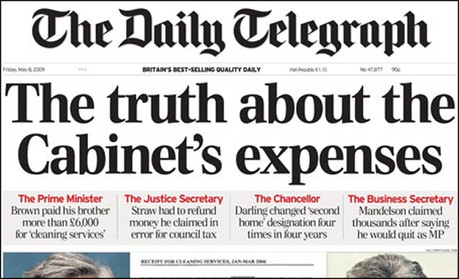
Former Telegraph editor Will Lewis said he was 'dogged' throughout the expenses story that the data was fake
The Telegraph paid £150,000 for the disc containing leaked data on MPs expenses, former editor Will Lewis told the Leveson inquiry today.
Executives from the newspaper dealt with a middleman, Lewis said, who represented the source of the expenses data in negotiations.
The middleman was paid an initial £10,000 for a sample disc, after which the Telegraph was given 10 days to assess the material. In the absence of chief executive Murdoch MacLennan, who also gave evidence to the inquiry today, the initial payment was authorised by finance director Finbarr Ronayne.
A further £140,000 was then authorised by MacLennan when Lewis was satisfied that the data was genuine. It was only when Jack Straw confirmed the details of his expenses that Lewis went ahead with publication, he told the inquiry.
The source wanted money, legal protection, and "to ensure fair and balanced coverage ... that both Labour and Conservative MPs got their day in the sun", Lewis said.
He went on to say that, having worked for the Sunday Times when it published the false Hitler diaries, he was "concerned from the beginning" that the data was a hoax, a concern which "dogged" him "all the way through" the story.
Lewis, who left the Telegraph for News Corporation in 2010, also refused to be drawn on whether he played any part in leaking information from the Telegraph – after his departure – that aided the business interests of News Corporation.
The leak concerned comments made by then-business secretary Vince Cable, who told undercover Telegraph reporters that he had "declared war" on Murdoch.
The Telegraph had decided not to publish the particular part of the Cable tape but it was leaked, leading to the removal of Cable – who had said he was minded to challenge News Corporation's bid for full control of BSkyB – as business secretary.
Cable's comments were published by the BBC's business editor Robert Peston.
The Telegraph later paid an independent corporate investigations firm, Kroll, to investigate the leak. Kroll later reported that it had reason to believe Lewis had "orchestrated" the leak.
Lewis told the inquiry today that to confirm or deny any part in the leak would endanger the protection of Peston's sources for the story.
With regard to MPs expenses, Lewis disagreed with the inquiry counsel's assertion that it was an investment. He said it was "a way to ensure that readers could know of the profound wrongdoing in the House of Commons".
Lewis told the inquiry that he didn't know whether the Telegraph had increased sales enough to cover the sum it paid for the disc. Unconfirmed reports at the time suggested that a Saturday edition of the Telegraph – which cost £1.80 at the time – with an expenses supplement sold up to 150,000 more copies than usual.
Free daily newsletter
If you like our news and feature articles, you can sign up to receive our free daily (Mon-Fri) email newsletter (mobile friendly).
Related articles
- Theodora Louloudis, head of audio at The Telegraph, on audio-first journalism
- Leveraging audio to drive subscriptions and memberships
- "TikTok does not have the same environment for media partners as Snapchat"
- 'Coronabump' provides an opportunity for news outlets to grow loyal audiences
- World News Day: Misinformation, mobile journalism and mental health









